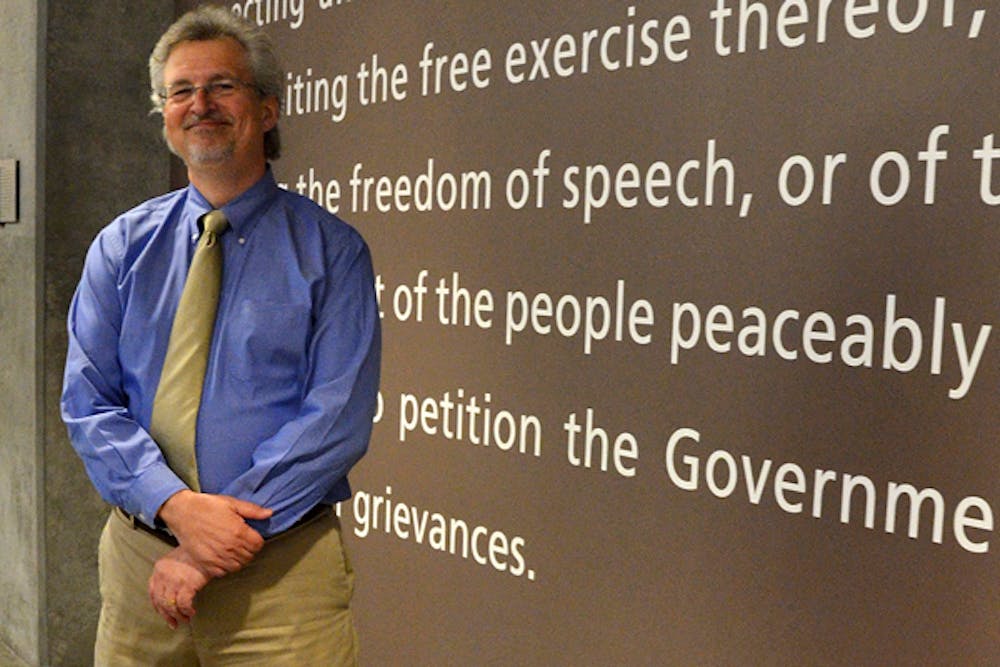 Media Law Associate Professor Joseph Russomanno wrote an op-ed about Fred Phelps, the leader of the Westboro Baptist Church, that was published on Time.com. (Photo by Rachel Nemeh)
Media Law Associate Professor Joseph Russomanno wrote an op-ed about Fred Phelps, the leader of the Westboro Baptist Church, that was published on Time.com. (Photo by Rachel Nemeh)The name Fred Phelps likely doesn’t sound familiar to most people, though his work as the leader of the radical Westboro Baptist Church certainly does.
But after Phelps died last month at the age of 84, Joseph Russomanno, who teaches media law at ASU, wrote an op-ed that discussed the complexity of Phelps’s existence in society.
Russomanno was invited to write the article by Zócalo Public Square, a project of ASU’s Center for Social Cohesion that publishes humanities journalism. The op-ed was then picked up by time.com.
Russomanno wrote that Phelps was an accidental champion of First Amendment rights, even though he was often considered one of the most hated people in the country. He said the Supreme Court case Snyder v. Phelps, which ruled in favor of Phelps’s free speech to hold protests at military funerals, was especially important in defining today’s free speech standards.
“I am very reluctant to give kudos to Fred Phelps himself or really to any member of his family, but the case itself was very important, and the ruling was very important,” he said. “His purpose and his family’s purpose was never to advance First Amendment freedoms but their actions, and eventually their case, resulted in that.”
Russomanno first heard of the Westboro Baptist Church when the Supreme Court case arose in the news, and once he knew about the group his interest was piqued, he said. After researching further, he decided to make a trip to Topeka, Kan., in 2010 to interview church members, and he eventually traveled to Washington, D.C., to see Snyder v. Phelps heard in the Supreme Court.
He said meeting the church members face-to-face was an insightful experience.
“They are reviled for what they do,” Russomanno said. “And that’s understandable, that most people would feel that way. But what I came to see was that they are in many respects very normal, very normal people. And there seems to be a natural inclination to see them as abnormal.”
He said his time spent with members of the Westboro Baptist Church revealed that many of society’s perceptions of them were incorrect.
“One of their main missions is to get out the word of God as they perceive it, and I understand they were welcoming of me, because they saw me as an instrument to help get out their word,” he said. “But the fact remains that they were very kind and welcoming of me and in the interviews they were very forthright and explained to me their points of views. … Another thing that a lot of citizens find hard to accept is they're very bright people. They’re very smart. Most of them are attorneys and practice law.”
Joe Mathews, columnist and innovation editor at Zócalo Public Square, said the publication specially invited Russomanno for the piece because of his rare personal experiences with the church members.
“The idea was to have a piece that explains a human being in all their complexities, written by someone with deep knowledge of what they’re talking about,” he said. "This is a classic case of that. It’s something a little more human and smarter.”
Tim McGuire, who teaches journalism ethics at ASU, said he’s long admired Russomanno’s dedication to examining the uglier side of free speech debates.
“Defending the First Amendment in its worst forms, when it includes hate speech and mean speech is very difficult work,” McGuire said. “It’s essential, and it’s terrifically important, but you weren't seeing very many defenses of Fred Phelps and Joe offered one … It’s not just nice speech that gets protected, but it’s mean speech too, and I think his willingness to take that on takes great courage and tenacity.”
He discussed the importance of arguments such as Russomanno’s in the modern era, where free speech is even more prevalent through a wide variety of mediums. With this greater amount of speech, it becomes more likely that the First Amendment will be questioned, he said.
“There are so many things happening, from abuse of journalists to the NSA,” McGuire said. “Many would like to make free speech subjective and not objective, and that’s something Joe has been a great advocate of from a research standpoint. … Free speech needs to be defended now probably more than ever.”
Even though Russomanno admits Phelps and the Westboro Baptist Church have reason to be hated, their accidental contributions to freedom of speech are an interesting side effect in history, Russomanno said.
“It’s groups and individuals like that, who are on the fringes, or some might call them the extreme, that tend to be the ones, if you look at First Amendment history, whose cases do go to the Supreme Court,” he said. “Because they are the ones who push the envelope. They push the boundaries of acceptability.”
Russomanno went on to say that although freedom of speech won’t likely be part of Phelps’s remembered legacy, it’s important to acknowledge this interesting historical paradox.
“The First Amendment can and does protect offensive, repugnant speech, or flipping that around, just because speech is offensive or repugnant doesn't mean it can’t be protected by the First Amendment,” he said. “Offensiveness is a subjective standard, and if you look at what’s really at the heart of any free speech decision, it’s the notion that as a culture and society we in the U.S. don't want the government making those subjective decisions for us.”
Reach the reporter at elmahone@asu.edu or follow her on Twitter @mahoneysthename




